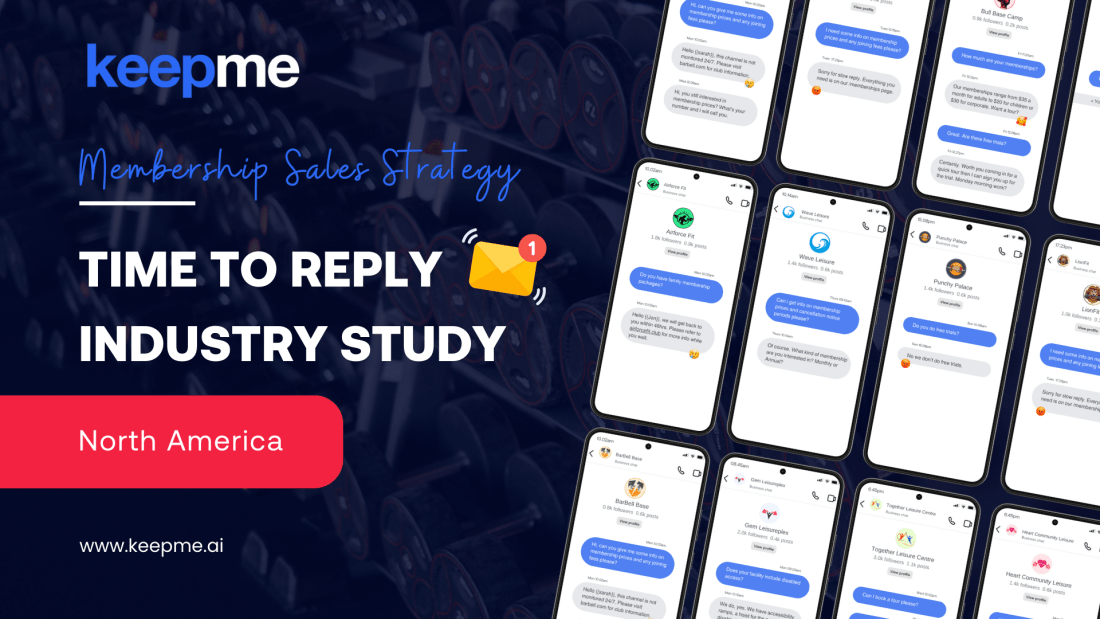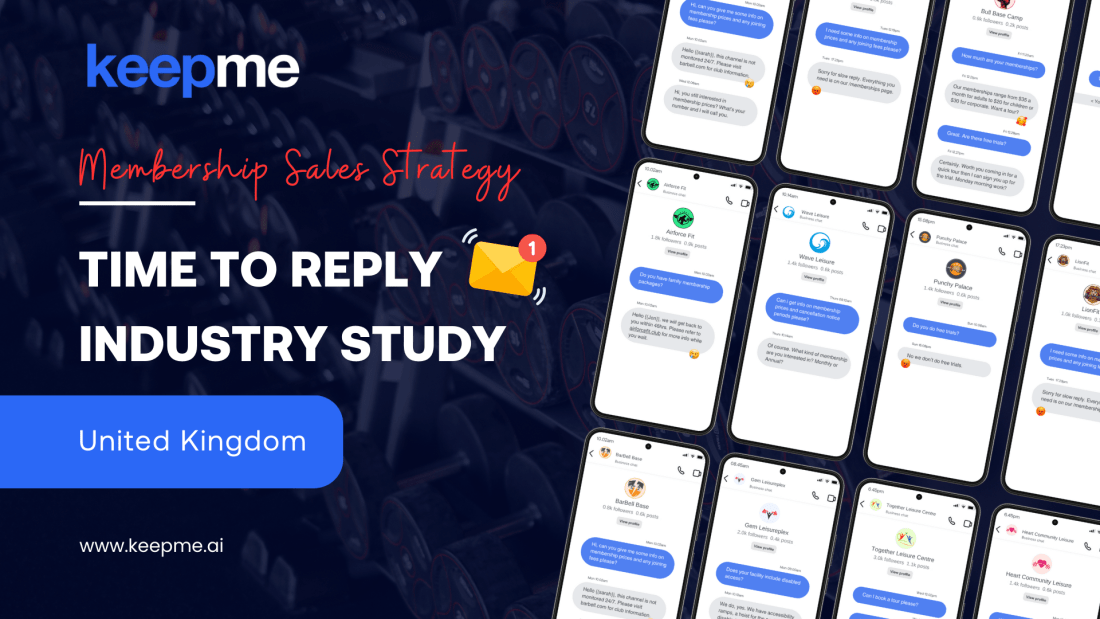Conversational AI is emerging as a game-changer in every industry, the fitness industry being no exception. Offering the potential to significantly enhance member acquisition efforts by providing personalized experiences, conversational AI improves engagement, and optimizes operational efficiency.
What is Conversational AI and Natural Language Processing?
Conversational AI refers to the use of artificial intelligence (AI) technologies like natural language processing (NLP) and machine learning (ML) to facilitate interactions that mimic human conversation. In gyms and fitness centers, this technology can be utilized through virtual assistants, chatbots, and automated messaging systems that engage with prospective members and existing clients in a natural and interactive way. In this article however, we will focus purely on the member acquisition side of things.
Natural Language Processing (NLP) is a specialized branch of artificial intelligence that focuses on the interaction between computers and human language. It enables machines to understand, interpret, and generate human language in a way that is both meaningful and contextually relevant. By analyzing text and spoken words, NLP allows machines to comprehend the nuances of language, including syntax, semantics, and even the subtleties of tone and emotion.
Importance of NLP in Conversational AI for Consumer Markets
In consumer markets, where personalized and seamless interactions are paramount, NLP plays a critical role in enhancing the effectiveness of Conversational AI. It allows AI systems to engage with customers in a natural, human-like manner, making interactions more intuitive and less robotic. Through NLP, conversational AI can accurately understand customer queries, respond with relevant information, and even anticipate needs based on prior interactions. This capability is crucial for building trust and rapport with consumers, ensuring that their experiences are not only efficient but also satisfying and tailored to their individual preferences. In essence, NLP empowers Conversational AI to bridge the gap between human expectations and machine capabilities, making it an indispensable tool for businesses aiming to deliver superior customer service and engagement.
How Natural Language Processing Benefits Gyms
NLP significantly enhances the process of converting gym membership prospects into paying members by enabling personalized, real-time communication that resonates with individual preferences and goals. With NLP, gyms can engage prospects 24/7, providing instant, contextually relevant responses that keep them engaged and moving toward a decision. Additionally, NLP-driven insights allow for more targeted follow-ups and the refinement of marketing strategies, ultimately streamlining the conversion process and improving the overall customer experience.
Why Conversational AI is Essential for Member Acquisition
1. Personalized Marketing and Outreach:
Conversational AI can analyze potential members’ data, such as their fitness goals, preferred workout times, and past gym experiences. This allows fitness centers to tailor marketing messages and offers specifically to each individual, making them more likely to convert from leads to members. For instance, a chatbot can suggest a membership plan that aligns with a prospect’s fitness goals based on their inquiries and interactions.
2. Enhanced Lead Engagement:
Prospective members often have questions before committing to a membership. Conversational AI can engage these leads 24/7, answering common questions instantly and guiding them through the process of booking a tour, or trial, pushing them deeper into their intent and thus likelihood to join. By providing real-time responses and personalized recommendations, the AI system keeps potential members interested and engaged, reducing the chance they’ll start looking elsewhere.
3. Streamlined Onboarding Process:
Once a lead decides to join, or is engaged in a free trial, conversational AI can further assist by automating the onboarding process. This might include helping trial members schedule their first gym visit, guiding them through your class scheduling app, directly signing them up for classes, or introducing them to your MyZone set-up and other digital tools. This seamless experience makes new members feel valued and supported from the start, increasing the chances of long-term retention.
4. Data-Driven Decision Making:
Conversational AI doesn’t just interact with potential members - it also gathers valuable data from these interactions. Fitness center operators can collate this data to understand what drives inquiries, what barriers exist for potential members, and which marketing strategies are most effective. For example, if many leads are asking about specific types of classes, the gym can prioritize messaging that promotes those classes, or indeed offer more of those classes to meet demand.
Practical Use Cases of Conversational AI in Fitness Centers
1. Automated Gym Tour Bookings
One of the most effective ways to convert prospective members is by inviting them to experience the gym firsthand through a tour. However, coordinating these tours can be time-consuming and resource-intensive for gym sales staff. Conversational AI can streamline this process by automating and personalizing the tour booking process, making it easier and more convenient for potential members to schedule a visit.
How It Works:
A conversational AI sales agent integrated into the gym’s website or social media platforms can engage with visitors in real-time, answering initial questions and guiding them through the process of booking a tour. For example, when a potential member expresses interest in visiting the gym, the AI can prompt them to choose an available date and time that fits their schedule. The system can also provide details about what the tour will include, such as a walkthrough of the facilities, an introduction to equipment, and a meeting with a trainer. On the other hand, the sales agent can be trained to nurture the conversation towards this desired action, by asking appropriate questions of the prospect.
2. Automated Membership Sign-Up:
AI-powered sales agents can guide potential members through the membership sign-up process, answering questions, offering package comparisons, and serving waivers and other documentation that needs to be completed, all within a chat interface. This automation reduces friction in the sign-up process and captures leads who might otherwise abandon the process due to confusion or inconvenience.
3. Class Scheduling and Booking:
Trial Members can use conversational AI to quickly check unfamiliar class schedules and book spots in popular sessions, ensuring they get the best experience of your facility while still in consideration mode. This not only improves the prospect experience by providing easy access to services but also helps fitness centers manage class capacities and reduce no-shows through automated reminders.
4. Proactive Health Tips and Reminders:
AI can send personalized health tips, workout reminders, or motivational messages to prospects based on their fitness goals and activity levels, reminding them of their reasons for wanting to join a gym, and potentially re-engage those that are lagging on the next step. For example, if a member hasn’t booked a tour a week after their first enquiry, the AI could send a friendly reminder or offer a special incentive to encourage them to take the next step.
5. Virtual Fitness Coaching:
Conversational AI can also act as a virtual coach, providing workout suggestions, answering fitness-related questions, and even offering nutritional advice based on the prospect’s preferences and goals. This added layer of support can differentiate a fitness center from competitors, particularly in the eyes of new members looking for comprehensive wellness support.
Best Practices for Implementing Conversational AI in Fitness Centers
1. Define Clear Objectives:
Before implementing conversational AI, fitness operators should identify specific goals, such as increasing membership sign-ups, improving prospect experiences and trial member satisfaction, or enhancing marketing efforts. Clear objectives will guide the AI’s role in the business strategy and help measure its effectiveness.
Operators may choose to get more granular with their goal setting by evaluating the following first so they have a benchmark of comparison before and after they implement a sales agent:
What percentage of membership inquiries are we currently responding to within ‘x’ amount of time?
What percentage of those inquiries successfully book a tour?
What channels deliver the most number of leads?
What channels have the highest and/or lowest conversion rates?
What is our current Cost Per Lead (CPL)?
What is our current Cost Per Acquisition (CPA)?
Knowing your ‘time to reply’ and other success metrics like the percentage of membership inquiries successfully responded to will first and foremost help you understand how your facility is performing but also show you how much room for growth you have.

 2. Start with High-Impact Areas:
2. Start with High-Impact Areas:
Rather than deploying AI across all channels at once, you might want to start with areas that will have the most immediate impact, such as lead engagement via social media. This could be because you have ad spend committed on this channels and you want to maximize the performance of that commitment, or conversely because these channels are poorly manned in general and you are missing too many leads because your team is under-resourced and can’t service them.
This allows the team to refine the AI’s performance and make adjustments before scaling it up.
3. Maintain a Balance Between AI and Human Interaction:
While AI can handle many tasks, some potential members will still prefer human interaction, especially for complex inquiries or personal concerns. Fitness centers should ensure that members can easily transition from AI to human staff when needed.
The good news is that, utilized sympathetically, AI sales agents will actually provide more time for your gym sales team to engage in face-to-face interactions by removing the administrative burden on them, and so therefore more human interaction for the prospects that want that kind of attention.
5. Regularly Update and Train the AI:
Conversational AI should be regularly updated with new data and trained to understand your business, your facility, your ethos and policies, emerging trends in fitness and gym member behaviors. Continuous learning will keep the AI relevant and effective in its role.
6. Ensure Compliance and Data Security:
Handling sensitive member data requires that the AI system complies with all relevant regulations and maintains high standards of data security. This builds trust with members and safeguards the gym’s reputation.
We recommend that you only engage AI technology where the data models are kept in house, and thus no sharing of data back to third parties.
Conversational AI is not just a tech trend but a strategic tool that can transform how fitness centers attract and retain members. By leveraging AI to enhance personalized marketing, streamline operations, and provide round-the-clock engagement, fitness operators can stand out in a crowded market and significantly boost their member acquisition efforts. Implementing AI thoughtfully and strategically will ensure that gyms and fitness centers can meet the evolving expectations of today’s fitness enthusiasts while driving long-term business success.

Ready To Learn More About AI Sales Agents?
Imagine boosting membership sales and cutting costs - 24/7, across all channels...sounds good, right?






